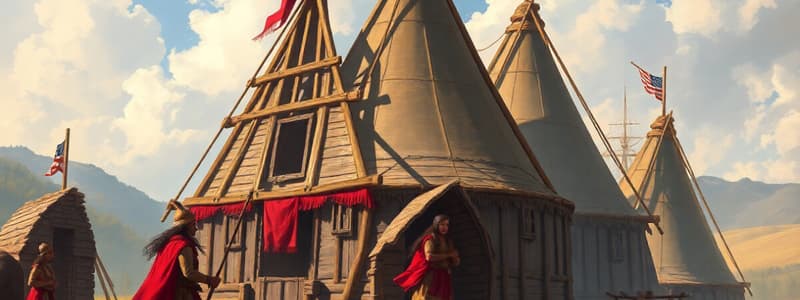Podcast
Questions and Answers
What was the main cause of the French and Indian War?
What was the main cause of the French and Indian War?
- British colonists wanting to expand into French territory (correct)
- Religious differences between French and British colonists
- Competition for resources like timber and farmland
- Disputes over control of the fur trade
How did the British colonists benefit from the outcome of the French and Indian War?
How did the British colonists benefit from the outcome of the French and Indian War?
- They gained control of valuable fur trading routes and established new settlements in the Ohio Valley.
- They gained access to new and vast territories west of the Mississippi River.
- They eliminated the threat of French competition in North America and expanded their control. (correct)
- They were relieved of the need to contribute to the war effort and could focus on economic development.
Which of the following was NOT a factor that contributed to the British victory in the French and Indian War?
Which of the following was NOT a factor that contributed to the British victory in the French and Indian War?
- The British navy's dominance in key naval battles
- The weakness of the French colonial government in Canada, which lacked sufficient resources and manpower
- William Pitt's strategy of making peace with Native American allies and adopting their fighting tactics
- The superior military training and equipment of British troops compared to French forces (correct)
How did the French & Indian War affect the relationship between Britain and its American colonies?
How did the French & Indian War affect the relationship between Britain and its American colonies?
What were the primary motivations for the establishment of Jamestown and Plymouth colonies?
What were the primary motivations for the establishment of Jamestown and Plymouth colonies?
Why did the British colonists depend heavily on enslaved labor in the Southern Colonies?
Why did the British colonists depend heavily on enslaved labor in the Southern Colonies?
Which of the following accurately describes the relationship between the British colonies and Native Americans during the French and Indian War?
Which of the following accurately describes the relationship between the British colonies and Native Americans during the French and Indian War?
Flashcards
Jamestown
Jamestown
The first successful English settlement founded in 1607, aimed at making money.
Mayflower Compact
Mayflower Compact
An early agreement for self-governance signed by Pilgrims in 1620.
13 Colonies
13 Colonies
A group of British colonies established in North America during the early 1700s.
New England Colonies
New England Colonies
Signup and view all the flashcards
Middle Colonies
Middle Colonies
Signup and view all the flashcards
Southern Colonies
Southern Colonies
Signup and view all the flashcards
Transatlantic Slave Trade
Transatlantic Slave Trade
Signup and view all the flashcards
French & Indian War
French & Indian War
Signup and view all the flashcards
Study Notes
British Colonization
- British colonization involved establishing settlements in North America.
- Early settlements like Jamestown (1607) aimed to profit from resources.
- The Plymouth Colony (1620), founded by Pilgrims, sought religious freedom.
- The Mayflower Compact, an early form of democracy, was established by the Pilgrims.
- Thirteen British colonies existed in North America by the early 1700s.
- Colonization led to the development of different colonial regions.
Native Americans Before Colonization
- Native American groups had diverse cultures and locations in the 1600s.
- Major Indian groups and culture areas are illustrated in the documents.
- Geographical regions are noted for each tribe.
Early Colonial Regions
- New England Colonies focused on shipbuilding, fishing, and whaling due to lack of good farmland.
- Massachusetts, Rhode Island, Connecticut, and New Hampshire were part of this region.
- Middle Colonies were known as the "breadbasket" due to good farmland and agriculture.
- New York, New Jersey, Delaware, and Pennsylvania were part of this region.
- Southern Colonies relied on cash crops like tobacco, rice, and indigo, using enslaved labor extensively.
- Maryland, Virginia, North Carolina, South Carolina, and Georgia were part of this region.
The Transatlantic Slave Trade
- Between the 1500s and 1800s, approximately 10 million Africans were forcibly enslaved and brought to the Americas.
- Around 388,000 enslaved Africans were brought to North America.
- The arrival of enslaved Africans in Jamestown, in 1619, marked a significant event.
- Colonial economies heavily relied on enslaved labor.
French and Indian War (1754-1763)
- The war was a global conflict between France and England.
- Land disputes along the Ohio River Valley triggered the war.
- British colonists sought expansion into French territory.
- France, Algonquians, Hurons, and Ottawas fought against British colonists and Iroquois.
- William Pitt's strategies and significant British naval victories marked turning points in the conflict.
- The Treaty of Paris (1763) resulted in the British expanding into territory previously controlled by France.
- The war proved expensive and led to increased colonial taxes and financial burdens for Britain.
Studying That Suits You
Use AI to generate personalized quizzes and flashcards to suit your learning preferences.



